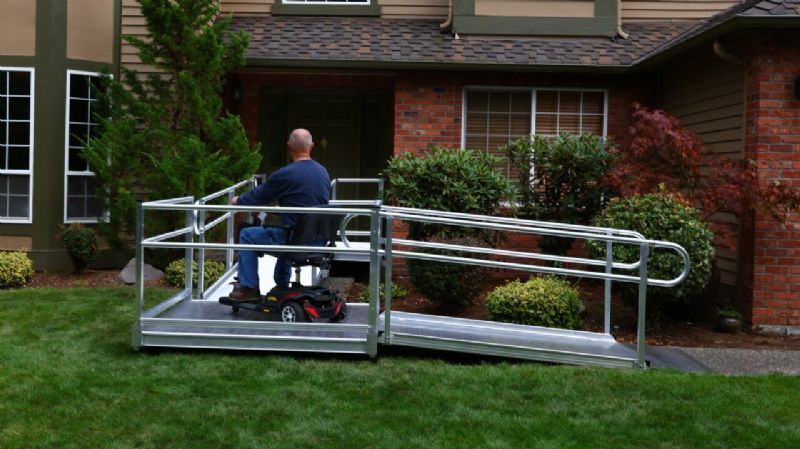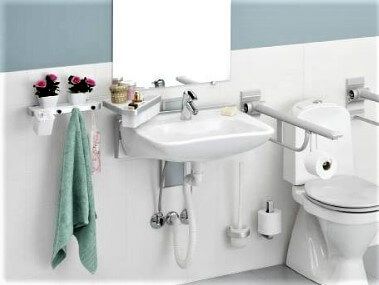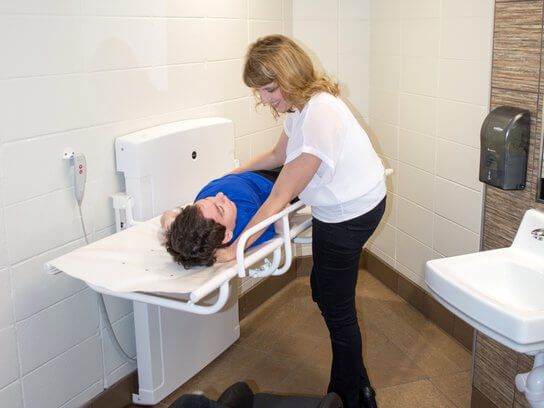 Written by Susan Griffitts, MSN, RN, FCN
Written by Susan Griffitts, MSN, RN, FCN
With more than 60 million adults living with a disability in the U.S., there are millions of homes that need modifications to accommodate the needs of their disabled residents. Installation of equipment like wheelchair ramps, ceiling lifts, and other accessibility aids help people safely age in place at home, which for many people is preferable to entering a care facility.
Although not a requirement in residential homes, the Americans with Disabilities Act (ADA) includes residential dwelling unit guidance for new construction. So if you’re remodeling to install equipment that will help you remain in your home, or if you’re building to ADA standards, what’s the best way to make that happen? Your options are making it a do-it-yourself project, hiring someone who doesn’t have a contractor’s license, or counting on a professional licensed contractor.
So what’s the best option to accommodate your home modification needs?
Table of Contents |
A licensed contractor has met industry standards in the state where they are performing work and has passed a certification test demonstrating their knowledge of accepted best construction practices as well as meeting building codes. Since acquiring a contractor’s license takes a significant investment of time and money, licensed contractors have demonstrated their commitment and ability to obey construction laws and regulations.

A licensed contractor oversees the project to ensure it’s completed on time, on budget, and according to the specifications laid out in the contract. They have put in the study time necessary to pass the licensure exam and are knowledgeable about local building requirements, and are authorized by a licensing board to work legally.
In addition to a license, reputable contractors are also insured, which benefits both the contractor and the client. Licensed contractors carry worker’s comp insurance. If there is a mishap on the job site, a contractor’s insurance policy will help pay for any employee injuries.
Licensed contractors are trained to meet all local and federal building requirements, ensuring the job won’t have to be redone for not being constructed according to code. Often, if a building permit is required by your municipality, it needs to be filed by a licensed contractor. If your project needs inspection approval, you will want a licensed contractor to complete the work to be sure all building requirements are met.
With a bond, the contractor pays a fee to a bond company. If the project isn’t completed as agreed (by the homeowner and contractor), the money from the bond is like an insurance policy, with proceeds paid to the homeowner. A bond is a guarantee the contractor will perform the work to the mutually agreed-upon specifications. The secured money within the bond goes to the homeowner if the contractor fails to uphold their end of the agreement.
In addition to worker’s comp insurance, licensed contractors have liability insurance. If something goes wrong and your property is damaged, liability insurance will protect you so you don’t have to pay for any of the damages.
Because licensed contractors have more invested in how they operate, they are usually more expensive to hire than unlicensed contractors. Also, although not carrying insurance enables an unlicensed contractor to charge less, the lack of insurance leaves the homeowner exposed to liability should someone get hurt or something gets damaged on a job site. Additionally, unlicensed contractors are not certified nor trained to meet professional standards.
If you are purchasing a ceiling lift, wheelchair ramp, or something similar - the whole point is safety, right? By the same token, it only makes sense to hire a licensed contractor.

If you’re installing a wheelchair ramp, ceiling lift, or other piece of medical equipment, there’s no doubt it’s to support safety while remaining at home. Personal well-being is not an area to cut corners, as a piece of equipment that is installed incorrectly can be a serious threat to safety.
Professional installation is offered on many pieces of equipment made to modify a home to accommodate an aging or disabled resident. The most common products people purchase installation for include:
A ceiling lift runs on a track that’s installed overhead, benefitting anyone who has trouble transferring out of bed to a chair or other location. Most newer homes have a TJI Joist, which supports the floor above but is not designed to hold anything - like a ceiling lift - from below. This can call for some specialized design and construction skills that can be expected from a licensed contractor, but not necessarily from an unlicensed contractor.
.jpg)
If you don’t want to purchase a ready-made ramp, or if you want a ramp to be a custom addition rather than a one-size-fits-all model, you can have a built-from-scratch wheelchair ramp. A licensed contractor knows the code requirements along with the proper size, pitch, slope, and placement of landings. Also, if you live where a wheelchair ramp requires an inspection, a licensed contractor is your best choice to ensure the ramp meets all structural requirements.

Adjustable sinks and toilets provide convenient access for people of any height or ability. Standard sinks, vanities, and toilets need to be removed first, with care not to damage the existing walls and floors, with patching and painting as necessary behind and under the new sinks. These new fixtures require a significant investment, so a licensed installer makes sense to protect your purchase and make sure that these specialty items work correctly from the start.

Changing tables support the entire weight of a user, and they are available in fixed and adjustable models. They are available in adult and pediatric sizes. They need to be installed in an area that can accommodate an attendant, and be fastened to the wall securely so there is no risk of the table collapsing and injuring a user. The expertise of a general contractor will ensure a wall-mounted changing table is placed where it can be securely installed while allowing for caregiver access.

Wall mounted shower benches require drilling into the shower wall. Placement is of utmost importance to keep from damaging the shower wall while ensuring the user’s weight will be safely supported. To guarantee a shower bench is placed properly and secured safely, a licensed professional should be hired.
.jpg)
If you’re not building a new bathroom, putting in a walk-in bathtub requires the removal of the current bathtub, so you’ll want the services of someone trained to remove the old tub without damaging the space. To install the new tub, you’ll need the services of a professional electrician and plumber licensed to pull permits for this kind of remodel.
.jpg)
Stairlifts make multi-level homes accessible for people who can’t navigate stairs. They consist of seats that run on tracks, and they are installed on one side of a stairway. Because they require drilling into floors and sometimes walls, and must be able to safely support the user, stairlifts need to be installed by professionally trained installation technicians. Often a warranty will not be enforceable if a stairlift is not installed professionally. Note that Rehabmart is Handicare Stairlift certified to provide professional installation.
.jpg)
Ask your friends, family, and neighbors if they have any recommendations for licensed contractors. Personal experiences shared with you by someone you trust is one of the best ways to find a qualified professional you can be comfortable hiring.
A quick internet search for exactly what you need will pull up a lot of resources. These websites feature professionals providing specific services, along with customer reviews:
Customer reviews are a great source of information. Remember to view them in their totality, as a competitor or unreasonable customer can leave a single review that skews an overall rating of a reliable service provider. Google and Facebook have review sections. To check licensing and any previous customer complaints, you can check resources like the Better Business Bureau or Crimcheck.
Ask for documentation from anyone doing work at your home that includes licensure in your state plus proof of insurance. Being licensed allows them to pull all required permits, and their insurance protects you from liability in the case of injury or property damage during the project. Note: the contractor must be licensed in the state where they are performing the work.
A contract is an agreement between parties, enforceable by law, that outlines the mutual obligations of each party. Because it is a legally binding document, you should go over the entire contract, asking any questions if something isn’t clear. There is no such thing as a stupid question! If you don’t know something for sure, it's best to ask for clarification.
A contract will typically include:

Being safe in your home is a priority. If you have challenges from aging or disability that require modifications to your home to ensure your safety there, it’s best to hire professionals to do the work. After all, if it’s going to be done, it should be done right, so you can relax and not worry about the quality of the work you’ve paid for.
For more information on equipment to make your home more accommodating when you face mobility challenges, visit Caregiver University. Caregiver University is a free resource for information on Aging in Place, Wheelchairs, Elderly Fall Prevention, and more!

After battling (and winning) cancer, Susan changed careers from being a paralegal to nursing. This decision was a direct result of the care received during her battle and all of her healthcare providers taking an interest in her as a person and not just a diagnosis. Thanks to those amazing experiences, this is the way Susan approaches nursing and caring for her patients. She is passionate about caring for all individuals but her primary focus is providing relief from the symptoms & stress of serious illnesses, the process of aging, and the particular problems of seniors.
Susan lost her right leg above the knee, to cancer, in 2013. Since that time, she has been very active in the amputee community helping to bring awareness and independence to other amputees. Read how Susan helped shape the future of new prosthetic devices.
 Ceiling Lift Track System with Portable Lift by Mackworth - CP440P - Full Ceiling Mounted or Gantry Lift Kit
Ceiling Lift Track System with Portable Lift by Mackworth - CP440P - Full Ceiling Mounted or Gantry Lift Kit
 Ceiling Mounted Track Lift Systems with Portable and Fixed Overhead Lift Options - Up to 1000 lb. Weight Limit - GoLift by Amico
Ceiling Mounted Track Lift Systems with Portable and Fixed Overhead Lift Options - Up to 1000 lb. Weight Limit - GoLift by Amico
.jpg&maxheight=250&width=365&product_name=Handicare Portable Ceiling Lift - Savaria Overhead Patient Lift System for Home or Hospital Use) Handicare Portable Ceiling Lift - Savaria Overhead Patient Lift System for Home or Hospital Use
Handicare Portable Ceiling Lift - Savaria Overhead Patient Lift System for Home or Hospital Use